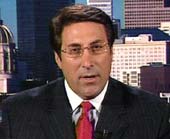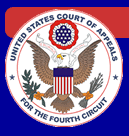Quote of the day: At last there's hope for a crucial federal appeals court, but hardly the liberal hell fantasized by wingnuts and their media stooges
>
 "I think everyone is concerned because the 4th Circuit literally hangs in the balance here. With the nature of the cases the court has been taking, especially on the terrorism issue, its direction is really critical."
"I think everyone is concerned because the 4th Circuit literally hangs in the balance here. With the nature of the cases the court has been taking, especially on the terrorism issue, its direction is really critical."--Jay Sekulow, chief counsel for the conservative American Center for Law and Justice, who we're told "has advised the White House on judicial nominees"
This is one of those cases, all too common in the Age of Rove, where you have to simultaneously keep track of two threads: the actual story, and the far-right-spun substitute-reality (another way of saying "fiction") that the cowed or possibly deluded media have accepted as reality from the wingnut propagandists who have taken control of public discourse.
 The actual story here, as far as one can discern from Jerry Karkon and Michael D. Shear's report in today's Washington Post (the full text appears below), is that "A number of prominent Republican appointees have left or announced plans to leave the U.S. Court of Appeals for the 4th Circuit." And the 4th Circuit Court, which sits in Richmond (in the Lewis F. Powell Jr. Courthouse, pictured here), has assumed unquestionably large importance in the federal court system, both because its proximity to the District of Columbia (it encompasses Maryland, Virginia, West Virginia, and North and South Carolina) and its modern-day extremely conservative composition have made it a sort of sub-Supreme Court especially beloved of Republican political strategists as an alternative to the more moderate Court of Appeals for the Federal Circuit.
The actual story here, as far as one can discern from Jerry Karkon and Michael D. Shear's report in today's Washington Post (the full text appears below), is that "A number of prominent Republican appointees have left or announced plans to leave the U.S. Court of Appeals for the 4th Circuit." And the 4th Circuit Court, which sits in Richmond (in the Lewis F. Powell Jr. Courthouse, pictured here), has assumed unquestionably large importance in the federal court system, both because its proximity to the District of Columbia (it encompasses Maryland, Virginia, West Virginia, and North and South Carolina) and its modern-day extremely conservative composition have made it a sort of sub-Supreme Court especially beloved of Republican political strategists as an alternative to the more moderate Court of Appeals for the Federal Circuit.  The reality is that the 4th has for decades now been a hotbed of far-right-wing judicial extremism, in part owing to the longtime stranglehold over nominations exercised by former North Carolina Sen. Jesse Helms (right), who curiously isn't mentioned in the Post article. Now, with the specter of the Democrats taking control of the Senate--and Pat Leahy (also not mentioned in the article) at the helm of the Judiciary Committee--the climate for the zoological primitives that Chimpy the Prez has been stuffing into the federal court system has unquestionably become chillier.
The reality is that the 4th has for decades now been a hotbed of far-right-wing judicial extremism, in part owing to the longtime stranglehold over nominations exercised by former North Carolina Sen. Jesse Helms (right), who curiously isn't mentioned in the Post article. Now, with the specter of the Democrats taking control of the Senate--and Pat Leahy (also not mentioned in the article) at the helm of the Judiciary Committee--the climate for the zoological primitives that Chimpy the Prez has been stuffing into the federal court system has unquestionably become chillier.But first off, in terms of any imminent swing to the left for the 4th, consider that, perhaps because of its importance and visibility, the Bush administration has already had surprisingly little success ramming its fugitive-mental-patient appeals court nominees through the Senate. This much is decently reported by Karkon and Shear.
 Hey, remember future felon Claude Allen, who went on to serve as President Bush's domestic policy adviser and also to be caught shoplifting at and scamming phony refunds from his local Target store? He was a 2003 Bush pick for the 4th. I guess he's one of the lunks White House spokesperson Dana Perino had in mind when she blithered, "The president has nominated several highly qualified people to fill vacancies on the 4th Circuit, and the Democrats have succeeded in each instance in blocking them. We will continue to work to find highly qualified nominees and look forward to their confirmations." Maybe I missed something, but I don't recall hearing any thanks to Senate Democrats for sparing the nation the indignity of Claude Allen as a judge on the 4th Circuit Court.
Hey, remember future felon Claude Allen, who went on to serve as President Bush's domestic policy adviser and also to be caught shoplifting at and scamming phony refunds from his local Target store? He was a 2003 Bush pick for the 4th. I guess he's one of the lunks White House spokesperson Dana Perino had in mind when she blithered, "The president has nominated several highly qualified people to fill vacancies on the 4th Circuit, and the Democrats have succeeded in each instance in blocking them. We will continue to work to find highly qualified nominees and look forward to their confirmations." Maybe I missed something, but I don't recall hearing any thanks to Senate Democrats for sparing the nation the indignity of Claude Allen as a judge on the 4th Circuit Court.Or how about Pentagon General Counsel William J. Haynes II, whose nomination to the 4th has faced opposition, not just from Democrats, but from South Carolina Republican Sen. Lindsey O. Graham, because of Haynes's deep immersion in the development and implementation of U.S. torture policy.
 Then there's the case of J. Michael Luttig, a longtime "star" right-wing judge on the 4th who was on the short list for each time Chimpy the Prez got to name a Supreme Court justice but was passed over all three times. Luttig is one of those "respectable" far-right judges--you know, the kind that wear shoes, and have their hair styled--who become so blinded by their own brilliance that life becomes barely endurable when they don't get the Supreme Court appointment they're obviously owed. "Conservatives were shocked," we're told, "when Luttig resigned in May to take a top corporate job at Boeing Co. Bush has nominated no one to replace him." The Postboys somehow don't mention his supreme snubbings.
Then there's the case of J. Michael Luttig, a longtime "star" right-wing judge on the 4th who was on the short list for each time Chimpy the Prez got to name a Supreme Court justice but was passed over all three times. Luttig is one of those "respectable" far-right judges--you know, the kind that wear shoes, and have their hair styled--who become so blinded by their own brilliance that life becomes barely endurable when they don't get the Supreme Court appointment they're obviously owed. "Conservatives were shocked," we're told, "when Luttig resigned in May to take a top corporate job at Boeing Co. Bush has nominated no one to replace him." The Postboys somehow don't mention his supreme snubbings.Is it really so surprising that Luttig cashed in his chips after being passed over for such comparative flyweights (in his mind) as "Smirkin' John" Roberts, "Poor Harriet" Miers and "Sammy the Slug" Alito? But if Luttig had gotten the call to the Supreme Court, would we have known that he was one snub away from snarfing down the big bucks--selling himself to the highest corporate bidder?
Does anyone really expect that Chimpy is going to start appointing liberals to the 4th? One of the few grains of sense in the Post article is this (from a liberal, of course):
Which brings us up against one of the basic layers of unreality that has descended on our discourse: the delusion that a court like the 4th is merely "conservative," as opposed to aggressively neanderthal. The fact is that moving "the 4th Circuit in a more moderate direction," as Aron imagines, wouldn't make that court "moderate," let alone "liberal." It would sort of bring it a couple of steps back from the brink of falling off the edge of the earth.Nan Aron, president of the liberal Alliance for Justice, said the new political landscape will force Bush to work closely with Democrats "to pick fair and open-minded judges who don't lean either to the right or the left" if he wants to get the administration's nominees confirmed. "If there were any way to appoint judges to move the 4th Circuit in a more moderate direction, that would be beneficial to both the circuit and to the country," she said.
It's only in the delusional Rovian universe that we can hear bilge like this:
A victory by a Democrat in the 2008 presidential election, Republicans and legal experts say, could accelerate a philosophical shift in the court. "Imagine the people Hillary Clinton would appoint to the 4th Circuit," said Carl Tobias, a law professor at the University of Richmond.To begin with, even the Postboys quote University of Pittsburgh law professor Arthur Hellman describing two (Bill!) Clinton appointees to the 4th, William B. Traxler Jr. and Robert B. King, as "fairly conservative." (Why? Because they had to get past the Senate veto of Senator Helms.)
 The fact is that even with a Democratic majority in the Senate, even if that majority were less fragile than it is (as witness the potential turmoil attending Sen. Tim Johnson's illness), the political climate has made it almost impossible to imagine any "liberal" nominee being confirmed for a federal judgeship. I realize that the far-rightists who have taken control of the political language consider Justice Ruth Bader Ginsburg, one of President Clinton's two Supreme Court appointees, a radical left-winger, but by any reasonable assessment she's a solid moderate--and of course Justice Stephen Breyer, the other Clinton appointee, is even more moderate. (Ginsburg and Breyer are seen above along with Reagan appointee Justice Anthony Kennedy at left.)
The fact is that even with a Democratic majority in the Senate, even if that majority were less fragile than it is (as witness the potential turmoil attending Sen. Tim Johnson's illness), the political climate has made it almost impossible to imagine any "liberal" nominee being confirmed for a federal judgeship. I realize that the far-rightists who have taken control of the political language consider Justice Ruth Bader Ginsburg, one of President Clinton's two Supreme Court appointees, a radical left-winger, but by any reasonable assessment she's a solid moderate--and of course Justice Stephen Breyer, the other Clinton appointee, is even more moderate. (Ginsburg and Breyer are seen above along with Reagan appointee Justice Anthony Kennedy at left.)Conservatives' Grip on Key Virginia Court Is at Risk
By Jerry Markon and Michael D. Shear
Washington Post Staff WritersA growing list of vacancies on the federal appeals court in Richmond is heightening concern among Republicans that one of the nation's most conservative and influential courts could soon come under moderate or even liberal control, Republicans and legal scholars say.
A number of prominent Republican appointees have left or announced plans to leave the U.S. Court of Appeals for the 4th Circuit, which has played a key role in terrorism cases and has long been known for forceful conservative rulings and judicial personalities.
Republican concerns also are fueled by the pending Democratic takeover of Congress, as several of President Bush's 4th Circuit nominees were already bottled up in the Senate when Republicans ran it. From the GOP's perspective, the situation now will worsen.
The 4th Circuit's rulings affect everyone who lives, works or owns a business in the area, which encompasses Maryland, Virginia, West Virginia and the Carolinas. The court's influence also has been widely felt nationally, and the emerging battle over it is part of a broader struggle for control of the federal judiciary.
"I think everyone is concerned because the 4th Circuit literally hangs in the balance here," said Jay Sekulow, chief counsel for the conservative American Center for Law and Justice, who has advised the White House on judicial nominees. "With the nature of the cases the court has been taking, especially on the terrorism issue, its direction is really critical."
Nan Aron, president of the liberal Alliance for Justice, said the new political landscape will force Bush to work closely with Democrats "to pick fair and open-minded judges who don't lean either to the right or the left" if he wants to get the administration's nominees confirmed. "If there were any way to appoint judges to move the 4th Circuit in a more moderate direction, that would be beneficial to both the circuit and to the country," she said.
The 15-member court has three vacancies, and a fourth judgeship will open in July. That would leave the bench with six Republican and five Democratic appointees by summer. In addition, one of those six Republican appointees has announced plans to take senior status as soon as a replacement can be confirmed. Senior judges receive full pay and hear cases but can take a reduced workload and are not considered active-service members of the court.
Some of the 4th Circuit's best-known rulings, upheld by the Supreme Court, include striking down a law allowing rape victims to sue their attackers in federal court and preventing the Food and Drug Administration from regulating tobacco.
In 1999, the 4th Circuit overturned the requirement that police read suspects their rights before interrogating them. The Supreme Court later reaffirmed the Miranda rights.
During the Bush administration, the 4th Circuit has been the court of choice on national security, issuing key rulings that backed the government on the detention of enemy combatants and the prosecution of Sept. 11, 2001, conspirator Zacarias Moussaoui. The court's conservative majority has included some of the nation's most prominent judges, including J. Michael Luttig and J. Harvie Wilkinson III.
Jan LaRue, chief counsel for Concerned Women for America, said she and other conservatives are disappointed with Bush and Senate Republicans for not pushing harder to fill the vacancies before losing control of the Senate.
"Now all they've done is managed to kick the can down the road, and we've lost the majority," said LaRue, whose group advocates for conservative jurists. "That circuit in the wrong hands could certainly move toward the center-left."
White House officials blamed Senate Democrats for the logjam. "The president has nominated several highly qualified people to fill vacancies on the 4th Circuit, and the Democrats have succeeded in each instance in blocking them," White House spokeswoman Dana M. Perino said. "We will continue to work to find highly qualified nominees and look forward to their confirmations."
The overall struggle for control of the federal courts is expected to grow even fiercer as Democrats take charge of the Senate with a razor-thin majority, assuming that Sen. Tim Johnson (D-S.D.), who has been hospitalized in recent days, continues in office. Although some conservatives blame Bush for failing to reshape the lower courts as effectively as he has the Supreme Court, others are joining him in aiming frustration at Democrats, who have used their minority power to block 4th Circuit and other appointments.
A victory by a Democrat in the 2008 presidential election, Republicans and legal experts say, could accelerate a philosophical shift in the court. "Imagine the people Hillary Clinton would appoint to the 4th Circuit," said Carl Tobias, a law professor at the University of Richmond.
The first of the current 4th Circuit vacancies has lingered since 1994, when Judge J. Dickson Phillips Jr. took senior status. Bush's nominee, U.S. District Judge Terrence W. Boyle Jr., has not overcome strong Democratic opposition.
In 2000, Judge Francis D. Murnaghan Jr. died. Bush nominated Virginia conservative Claude A. Allen in 2003, but he also was blocked by Democrats. Allen later resigned as Bush's top domestic policy adviser and pleaded guilty to shoplifting charges. Bush has not nominated anyone else for that vacancy.
Conservatives were then shocked when Luttig resigned in May to take a top corporate job at Boeing Co. Bush has nominated no one to replace him. Chief Judge William W. Wilkins Jr., a Ronald Reagan appointee who was the first chairman of the U.S. Sentencing Commission, recently announced that he will take senior status in July, creating a fourth vacancy. The new chief judge will be Karen Williams of South Carolina, the court's first female chief judge. She was appointed by President George H.W. Bush.
Another Republican appointee, H. Emory Widener Jr., 83, is planning to take senior status when his successor is confirmed. But Bush's nominee, Pentagon general counsel William J. Haynes II, has drawn strong opposition from Democrats and even from Republican Sen. Lindsey O. Graham (S.C.).
Even though the 11 judges who would remain by summer are split 6-5 in favor of Republican appointees, some court observers say that Democrats might gain effective control because Judge Allyson K. Duncan often votes with the court's moderate-to-liberal bloc. She was appointed by Bush in 2003, with strong support from John Edwards, a former Democratic senator from North Carolina and vice presidential candidate.
Yet predicting the court's precise direction is difficult. University of Pittsburgh law professor Arthur Hellman, for example, said two Clinton appointees--judges William B. Traxler Jr. and Robert B. King--are "fairly conservative." Hellman and some Republicans expressed surprise that Bush has not moved to fill Luttig's seat and keeps renominating Boyle and Haynes when they couldn't win confirmation in a Republican-led Senate.
Staff writer Peter Baker contributed to this report.





0 Comments:
Post a Comment
<< Home